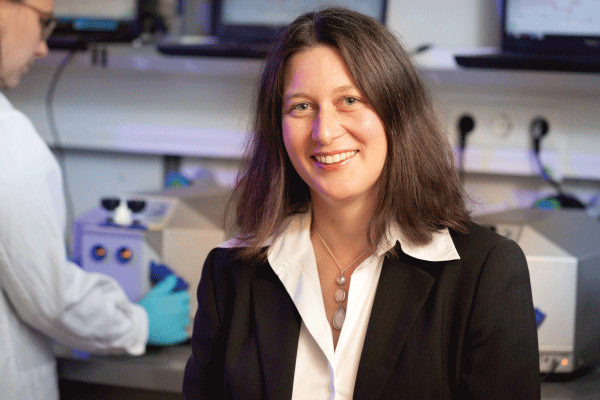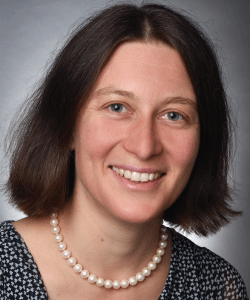Government Relations
Inside Grants: European Research Council Consolidator Grant

The European Research Council (ERC) is one of the premier funders of basic-science research in Europe. Established and supported by the European Commission, the ERC advances the frontiers of knowledge and promotes cutting-edge research in Europe while also attracting talent from abroad. The Consolidator Grant provides recipients with up to 2 million euros for 5 years to support innovative proposals and helps principal investigators consolidate their own independent research team or program.
Grant Information
- Country/Region: European Union
- Organization: European Research Council
- Grant Mechanism: Consolidator Grant
- Amount: €1,999,363
Iris-Tatjana Kolassa, an APS Fellow and Spence Award winner, is a professor of clinical and biological psychology at Ulm University, a relatively young university in southern Germany. She is a psychological scientist and licensed clinical and cognitive-behavioral therapist. The interdisciplinary research team she leads investigates the biomolecular consequences of chronic and traumatic stress, the biological underpinnings of the frequent comorbidity of psychological and physical diseases, and the reversibility (or nonreversibility) of stress-associated biomolecular alterations through psychotherapy. With this aim, she built the Outpatient Clinic for Psychotherapy at Ulm University and started three biomolecular labs that facilitate the investigation of immunological, endocrine, and biomolecular cell processes with a specialized focus on oxidative stress, telomeres, DNA integrity, and mitochondrial bioenergetics. Her group’s research and teamwork are characterized by high interdisciplinarity and an integrative view of mental health.

Iris-Tatjana Kolassa
What are you researching?
Traditionally, major depressive disorder (MDD) is conceptualized as a neurotransmitter deficiency in the brain. However, with pioneering methods, we have provided initial evidence for reduced mitochondrial energy production in MDD, characterizing it as a cellular-metabolic disorder. Through my ERC project, “Major depression as a metabolic disorder: The role of oxygen homeostasis and mitochondrial bioenergetics in depression etiology and therapy (MitO2Health),” we aim to develop a radically new pathophysiological model of MDD as a systemic energy-deficiency disease. We also wanted to go the extra mile and investigate whether psychotherapy can normalize mitochondrial energy provision in MDD. Therefore, we want to apply cognitive-behavioral therapy (CBT) as a randomized treatment condition to test whether CBT-related MDD symptom reduction is coupled to a normalization of mitochondrial and immunological parameters. Through MitO2Health, we aim to identify biomarkers of individuals’ responses to therapy. We hope that in the long run, our project will lead to new diagnostic standards and innovative personalized MDD treatment concepts.
How has ERC funding supported your research efforts?
I started the ERC project in October 2020, so I cannot yet evaluate research efforts. In this initial phase of the project, ERC funding enabled me to consolidate and expand my interdisciplinary team of psychologists, biologists, psychotherapists, and a medical technical assistant and to procure resources required to conduct the project. Moreover, it has already helped me and my team to gain further national and international visibility for our research efforts. For example, I was invited to participate as principal investigator in a consortium of excellent researchers under the guidance of the Central Institute of Mental Health in Mannheim (ZIHUb), part of the newly established German Center for Mental Health. In addition, I was asked to join a consortium of researchers in establishing a site of the German Center for Child and Youth Health at Ulm University. I think that being awarded the ERC opened up opportunities to be part of such ambitious initiatives.
What was the grant application process like for the Consolidator Grant?
Writing the grant was a tremendous amount of work—a 5- to 6-month full-time job! We had to fill out several forms (administrative, budget- and ethics-assessment, and ethical-clearance paperwork) and develop a project proposal that needed to be presented in a very condensed, 6-page format for the first assessment step. I then had to present my CV and an early-achievement track record on 2 pages each. At the same time, we had to submit a highly precise and detailed project proposal of 15 pages that would be evaluated only when we came to the second assessment round. After successful evaluation of the second, full proposal, I was invited to an interview in Brussels. Here, I had exactly 10 minutes to present the project idea, outline the project’s groundbreaking nature, and explain why I am the right person to conduct this kind of research. Preparing and practicing the talk was also an immense amount of work. The deadline for grant submission was in February 2019, the interview was in September 2019, and the news of the award came in December 2019.
What advice do you have for researchers applying for grants from the ERC?
I tried twice before to apply for an ERC starting grant but was not successful. However, this time we were well prepared and had collected pilot data proving the feasibility of the approach in advance. We also put intensive effort into developing the project proposal, and we asked for feedback from colleagues and mentors. In particular, round-the-clock discussions with members of my team developed into project ideas and how we could visualize certain things. I would advise researchers to be persistent; even if you are not successful at first, get feedback from colleagues and mentors. Also, practice the Brussels presentation thoroughly. I am well experienced at giving talks in front of audiences, yet, in the interview situation, I felt my heart beat as fast as when I took my driving license test or my PhD examination. In this situation, it is helpful to practice a lot; however, you also need to have consolidated knowledge and expertise in your field to precisely answer questions from a large group of reviewers.
Anything else you wish to share regarding the Consolidator Grant or your research?
I would like to thank my team for its tremendous support during the writing phase—in particular, Dr. Alexander Karabatsiakis, Dr. Alexander Behnke, Dr. Roberto Rojas, Nehir Mavioglu, Melissa Hitzler, Sarah Karrasch, Anja Gumpp, Felix Neuner, and Suchithra Varadarajan. I also would like to say thank you to the Center for Research Strategy and Support at Ulm University, particularly Dr. Beate Griepernau, Dr. Karl-Heinz Mueller, and Bernd Aumann for their excellent advice and for encouraging me to professionally practice the Brussels interview in a training simulation. Without them I would not have been able to perform so well.
I would also like to add that mental health researchers should be open to crossing boundaries between disciplines in order to tackle novel and challenging scientific problems. This strategy is quite demanding, as one needs substantial insights into other disciplines and methodologies. This is a humbling process; one needs to admit that one does not know everything. For me, this approach is rewarding and enables me to understand complex biological mechanisms and see novel connections; the more I realize that things fit together, the more I am encouraged to continue—despite the strain and frustration that scientific business often is!
More information on this grant can be found on the ERC website.
Feedback on this article? Email [email protected] or scroll down to comment.





APS regularly opens certain online articles for discussion on our website. Effective February 2021, you must be a logged-in APS member to post comments. By posting a comment, you agree to our Community Guidelines and the display of your profile information, including your name and affiliation. Any opinions, findings, conclusions, or recommendations present in article comments are those of the writers and do not necessarily reflect the views of APS or the article’s author. For more information, please see our Community Guidelines.
Please login with your APS account to comment.